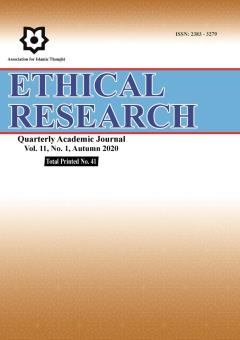رویکردی فلسفی به تلاقیهای اخلاق و هیجان
الموضوعات : Ethics and Islamic Educationسید احمد فاضلی 1 , مجتبی جعفری 2
1 - دانشگاه قم
2 - دانشگاه قم
الکلمات المفتاحية: حیث التفاتی, ارزیابی, انگیزش, منش اخلاقی, فضیلت.,
ملخص المقالة :
سبب توجه اهل فلسفه به هیجانات آن است که معرفت و شادکامی و اخلاق که از دیرباز دلمشغولی اصلی فلسفه بود تلاقیهای بسیاری با هیجانات دارد. از این رو، فیلسوفان کوشیدهاند تا نشان دهند ارزش و جایگاه هیجانات در کسب معرفت و تحصیل شادکامی و زندگی اخلاقی چیست. فیلسوفان در مقایسه با عالمان بیشتر بر تحلیلهای انتزاعی درباب هیجانات متمرکزاند. کاوش در سرشت هیجان به مسائل فلسفی چندی میانجامد از جمله: هیجان و دیگر عواطف آدمی چه تمایزاتی دارند؟ آیا هیجان ارزیابانه است یعنی باید آن را از جنس حکم و داوری دانست یا از سنخ ادراکات یا چیز دیگری به شمار آورد؟ شأن معرفتی هیجانات و نسبت آن با احکام و داوریهای ارزشی چیست؟ چه رابطهای میان انگیزش و هیجان است؟ و سرانجام، جایگاه هیجان در اخلاق کجاست و چه تأثیری بر شکلگیری فضیلت و منش اخلاقی دارد؟.
ارسطو (1385)، اخلاق نیکوماخوس، محمدحسن لطفی، تهران، طرح نو.
زگزبسکی، لیندا (1396)، فضایل ذهن، امیرحسین خداپرست، تهران، کرگدن.
هیوم، دیوید (1397)، رسالهای دربارة طبیعت آدمی: کتاب دوم و سوم، جلال پیکانی، تهران، ققنوس.
Annas, J. (2011). Intelligent Virtue. Oxford: Oxford University Press.
Ayer, A. J. (2001). Language, Truth and Logic. New York: Penguin Books.
Battaly, H. (2014). Virtue. Cambridge: Polity Press
Brentano, F. (1889/2009). The Origin of Our Knowledge of Right and Wrong. London: Routledge.
Charland, L. (2005). The heat of emotion: valence and the demarcation problem. J Consciousness Stud, 12 : 82–102.
Damasio, Antonio (1994/2005). Descartes’ Error: Emotion, Reason, and the Human Brain. New York: Penguin Books.
Deonna, J., Rodogno, R. & Teroni, F. (2011). In Defense of Shame : The Faces of an Emotion. Oxford : Oxford University Press.
Deonna, J. & Teroni, F. (2012). The Emotions: A Philosophical Introduction. New York : Routledge.
Döring, S. A. (2003). Explaining action by emotion. Philos Q, 53 : 214–230.
Döring, S. A. (2014). Why recalcitrant emotions are not irrational. In Todd, C. & Roeser, S. (éd.) Emotion and Value. Oxford : Oxford University Press.
Elster, J. (1999). Alchemies of the Mind : Rationality and the Emotions. New York : University Press.
Goldie, P. (2000). The Emotions: A Philosophical Exploration. Oxford : Oxford University Press.
Griffiths, P. E. (2013). Current Emotion Research in Philosophy. Emotion Review, Vol. 5, No. 2, 215–222.
Haidt, J. (2003) The moral emotions. In: Davidson JR, Scherer KR, Goldsmith HH (eds) Handbook of affective sciences. Oxford: Oxford University Press.
Helm, B. (2010). Emotions and motivation: reconsidering neo-Jamesian accounts. In Goldie, P. (éd.) Oxford Handbook of Philosophy of Emotion. Oxford : Oxford University Press.
Hume D.(1739–1741/2007) In: Norton DF, Norton MJ, eds. A Treatise of Human Nature. Vol 1. Oxford: Oxford University Press.
Kenny, A. (1963). Action, Emotion and Will. London : Routledge and Kegan Paul.
Nussbaum, M. C. (2004). Emotions as judgments of value and importance. In Solomon, R. C. (éd.) Thinking About Feeling: Contemporary Philosophers on Emotions (pp. 183-199). New York : Oxford University Press.
Prinz, J. (2004). Gut Reactions : A Perceptual Theory of Emotions. New York : Oxford University Press.
Prinz, J. (2007). The Emotional Construction of Morals. New York : Oxford University Press.
Roberts, R. C. (2003). Emotions: An Essay in Aid of Moral Psychology. Cambridge : Cambridge University Press.
Roberts, R. C. (2013). Emotions in the Moral Life. New York : Cambridge University Press.
de Sousa, R. (1987). The Rationality of Emotion. Cambridge : MIT Press.
Tappolet, C. (2010). Emotions, action, and motivation : the case of fear. In Goldie, P. (éd.) Oxford Handbook of Philosophy of Emotion. Oxford : Oxford University Press.
Teroni, F. (2017). In pursuit of emotional modes: The philosophy of emotion after James. Dans A. Cohen & B. Stern (éd.), Thinking about the emotions: A philosophical history. Oxford: Oxford University Press.


